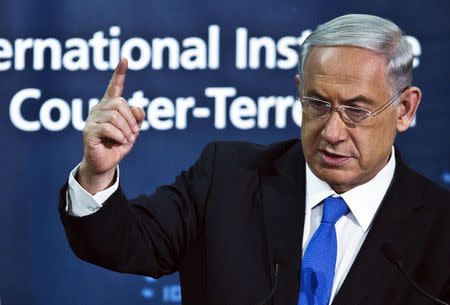Wiretaps against Palestinians are wrong, Israeli ex-spies tell Netanyahu

By Dan Williams JERUSALEM (Reuters) - Dozens of reserve soldiers from Israel's top electronic surveillance unit say they will no longer spy on Palestinians living under occupation, in an unprecedented rebuke to Prime Minister Benjamin Netanyahu's security policies. A protest letter signed by 43 veterans of Unit 8200, sent to Netanyahu and armed forces chiefs and excerpted by Israel's biggest-selling newspaper on Friday, was dismissed by the military as a publicity stunt by a small fringe. By decrying the sweep of eavesdropping on Palestinians, and the role such espionage plays in setting up air strikes that have often inflicted civilian casualties, the move opened a window on clandestine practices that usually go unreported. It also tapped into wider international debate over the ethics of state surveillance following last year's media leaks by Edward Snowden, a former contractor with the National Security Agency (NSA), the U.S. counterpart to Unit 8200. "We refuse to take part in actions against Palestinians and refuse to continue serving as a tool for deepening military rule in the occupied (Palestinian) territories," Yedioth Ahronoth daily quoted the letter as saying. "Intelligence allows ongoing control over millions of people, thorough and intrusive monitoring and invasion into most aspects of life. All of this does not allow for normal living, fuels more violence and puts off any end to the conflict." No signatories' names were published, in apparent keeping with their non-disclosure commitments to Unit 8200, which monitors enemy Arab states and Iran as well as the Palestinians. Several were interviewed anonymously by Yedioth and by Israel's Army Radio, however, and complained about what they described as the abusive gathering of Palestinians' private information - for example, sexual preferences or health problems "that might be used to extort people into becoming informants". PALESTINIANS HAIL PROTEST When surveilling its own citizens, including the 20 percent Arab minority, the Jewish state requires court or parliamentary oversight. Israeli spies have a far freer hand against Palestinians in the West Bank or Gaza Strip. Netanyahu's office had no immediate comment on the protest letter. There was praise for it from the U.S.-backed Palestinian administration, which has pursued uneasy West Bank security coordination with Israel even as peacemaking remains stalled. "If there are, among the Israelis, 43 soldiers who reject the idea of occupation, we view this as a moral act," Palestinian security services' spokesman Adnan Damiri said. "We salute humanitarian ideas like this toward an oppressed people." Yedioth said the letter was unrelated to Israel's July-August war in Islamist Hamas-controlled Gaza, in which around 2,100 Palestinians, mostly civilians, died. But some of the protesters rued their contribution to earlier air strikes on Palestinian militant chiefs which harmed innocent bystanders. "We now understand that the responsibility is not just that of the soldier standing at the checkpoint, the soldier who squeezes the trigger," one signatory, identified as a Unit 8200 reserve captain, told Army Radio. "We have responsibility." The military spokesman's office said in a statement that Unit 8200 personnel were held to ethical standards "without rival in the intelligence community in Israel or the world", and had internal mechanisms for filing misconduct complaints. That process had been circumvented by the letter-writers, the spokesman's office said: That they went first to the media "raises serious doubt as to the seriousness of their claims". Amos Yadlin, a former chief of Israeli military intelligence under Netanyahu, played down the letter, saying 43 reservists were a "fringe percentage" of those available to Unit 8200. "It's a big outfit, so naturally a few of its veterans may gravitate to the far left, as well as to the far right" said Yadlin, who now runs Tel Aviv University's INSS think-tank. Israel has in recent years seen similar statements by a small number of conscientious objectors among reservists of its air force and its premier infantry unit, as well as an Oscar-nominated documentary in which former directors of its Shin Bet domestic intelligence agency questioned the sustainability of the occupation. (Additional reporting by Ali Sawafta in Ramallah; Editing by Andrew Roche)

 Yahoo News
Yahoo News 